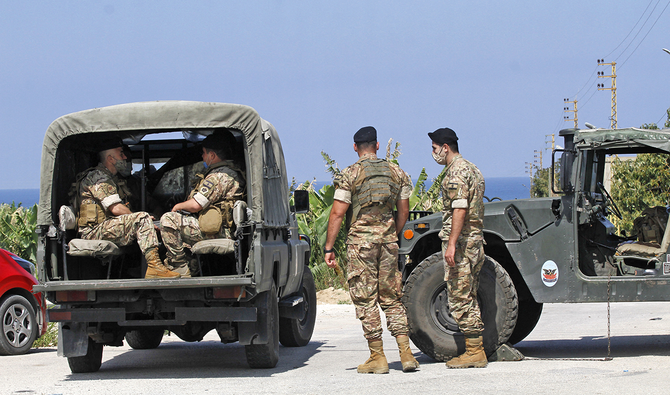BEIRUT: Lebanon’s response to the violence in Gaza and its relationship with Palestine is the subject of angry debate after rockets were fired from southern Lebanon toward Israeli settlements.
Former MP Nadim Gemayel warned that “Lebanon is neither a military base nor a missile platform for Palestinian factions or Iranian militias.”
He demanded that “the state and security services act quickly and strike with an iron fist, for Lebanon today cannot afford to repeat the experience of the 60s.”
Gemayel said the “number one cause today is the Lebanese cause only.”
MP Bilal Abdallah said that “Lebanon is facing an economic collapse and a vacuum in its political power, and the Palestine issue should not be put at the forefront.”
He told Arab News: “What is happening requires insight and calm.”
The remarks of both political figures came as Lebanese and Palestinian youths stormed a fence on the Blue Line between Lebanon and Israel on Friday.
However, they were unable to cross the Israeli security barrier that stood in their way.
Groups of young men demonstrated near the border area facing the settlement of Al-Mutla, and attempted to cross a barbed-wire fence to gain access, but were met with tear-gas canisters fired by Israeli troops, forcing them to disperse and return to Lebanese territory.
The incident came after rockets were launched from southern Lebanon on Thursday toward Israeli settlements.
While Hezbollah denied any connection to the strikes, a statement hinted at the group’s potential involvement in the conflict if violence worsens.
The Lebanese army announced on Friday that “military units found three rockets in the vicinity of the Rashidieh refugee camp in the Tire region in southern Lebanon.”
At least four Grad missiles were fired from the vicinity of the Rashidieh camp, targeting the Israeli settlements of Shlomi and Nahariya. No party has claimed responsibility for the attacks.
Maj. Gen. Subhi Abu Arab, commander of the Palestinian National Security Forces in Lebanon, told Arab News that he visited the Rashidieh camp on Friday morning for an inspection, and that “the situation was normal.”
He said: “No rockets were fired from the camp or its surroundings, but rather from an area further away.
“We do not know who fired the rockets, and we leave the matter to the Lebanese army, as this area falls under its responsibility, and the army units are carrying out their tasks in search of the rocket launchers.
“I have not received any information until now about the matter from Lebanese Army intelligence.”
The Lebanese quandary over Palestine is a division that goes back to the demands of the Maronite Patriarchate for Lebanese neutrality.
Solidarity with Palestine dominated Friday sermons in mosques, and protests broke out around the country.
MP Bilal Abdallah told Arab News: “Emotionally, we are all in solidarity with the Palestinians and distressed by the killing that is taking place against the innocent. There is no arguing on this matter. But expanding the war zone is a matter that needs to be studied.”
Abdallah said: “If opening the Lebanon front is required, this has its own calculations and consequences.”
He added: “Let us look at the prospects of the ongoing clash, whether it is rectified with a cease-fire or if it escalates.”
The MP said that Lebanon “cannot afford any involvement in what is happening, so let it be a complete front and not only Lebanon, but rather open the Golan fronts all the way to Jordan.”
Abdallah added: “The existing communication in the region involves redrawing their map, and this presupposes the need to avoid rushing to judgment.”
However, another popular sentiment among the Lebanese public is that the issues facing their own country should be dealt with first, before foreign affairs are considered.
The Lebanese internal crisis was aggravated by the announcement of the Electricite du Liban (EDL) on Friday that electricity supply has begun to decline after Turkey’s Karpowership, which supplies the country through two floating stations, said it had “suspended supplies due to payment arrears, and after a legal threat to its stations.”
A spokesperson said that the company “regretted turning off the generators,” adding that it had “made every effort to avoid taking this decision.”
Lebanon receives 370 megawatts of electricity from the company, about a quarter of total supply.
The country may face critical electricity problems unless, according to the EDL statement, a speedy decision is made regarding a controversial treasury advance of 300 billion Lebanese pounds ($196 million) for the resumption of tenders for the buying of fuels, especially gas.
The EDL has also urged officials to secure hard currencies for production, transportation, and distribution, to ensure a minimum level of stability in Lebanon’s electricity supply.



























